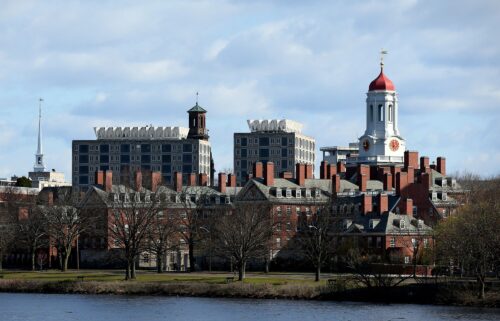California lawmakers approve bills including eviction protections and mental health care reform
By TRÂN NGUYỄN
SACRAMENTO, Calif. - The California Legislature voted Thursday to bolster eviction protections for renters and close a loophole in an existing law that has allowed landlords to circumvent the state’s rent cap.
The eviction reform bill was among hundreds approved before the end of a late legislative session, including giving striking workers unemployment benefits and reforms to the state’s mental health system.
Democratic Gov. Gavin Newsom has until Oct. 14 to act on the bills by signing them into law, rejecting them with a veto or allowing the bills to become law without his signature.
The rental bill by Democratic state Sen. María Elena Durazo would update a 2019 landmark law creating rules around evictions and establishing a rent cap at 5% plus the inflation rate, with a 10% maximum.
The governor was the architect of the 2019 law on renter protections, but he has not indicated whether he will sign the new eviction legislation, the bill sponsors said.
Under the 2019 law, landlords can evict tenants for "at fault" or "no fault" reasons. "At fault" reasons include failure to pay rent on time. Under "no fault" rules, landlords can terminate leases merely by saying they need to move into units, make repairs or take the units off the rental market.
Renters’ advocates said some landlords have exploited the "no fault" evictions to get around the state’s rent cap. They pointed to a case in Santa Clara County in which a landlord evicted tenants, citing the need to move in their relatives, but then re-listed the units at nearly double the price.
Under Durazo’s new bill, landlords moving into their unit or renting to family also must identify the people moving in, the rental must be occupied within three months of eviction and they must live in the unit for at least a year. Those who evict tenants to renovate properties must include copies of permits or contracts, among other details, when serving eviction notices.
Landlords who do not follow through would have to allow evicted tenants to move back under the original lease terms.
The bill also would allow the attorney general, local government and renters to sue landlords for wrongful evictions and illegal rent increases.
Proponents said the changes would ensure landlords can no longer abuse state law.
"What the bill would do is really restore the promise of the Tenant Protection Act by closing these loopholes and adding some critical enforcement mechanisms so tenants and local governments can hold bad actors accountable," said Suzie Dershowitz, a representative of Public Advocates.
The bill faced fierce backlash earlier this year from powerful landlord groups, who said the changes went too far and successfully pressured lawmakers to eliminate a provision to reduce the state’s rent cap to 5%.
Here is a look at some of the measures lawmakers voted on during Thursday’s session:
MENTAL HEALTH SYSTEM
Senators signed off on putting two proposals before voters next March that would help transform the state’s mental health system and address the state’s worsening homelessness crisis.
A measure by Assemblymember Jacqui Irwin would allow the state to borrow $6.38 billion to build new treatment beds and housing. A proposal by Democratic Sen. Susan Eggman would overhaul how counties pay for mental and behavioral health programs.
Newsom called the measures "a key part of the solution to our homelessness crisis" in a statement Thursday.
"Now, it will be up to voters to ratify the most significant changes to California’s mental health system in more than 50 years," he said.
Irwin said her bill would bring "the single largest expansion" of the state’s mental health system. The money would help build 10,000 treatment beds and housing, some of which would serve veterans with mental illness or unhealthy drug and alcohol use, and provide up to $1.5 billion in grants for local government and indigenous tribes.
Republican Sen. Brian Jones criticized Irwin’s proposal, saying it’s not fiscally responsible to take on more debts when the state continues to face budget deficits.
Eggman’s bill, which passed unanimously in the Senate, would restrict the how local governments can use a special tax on millionaires that have been used to fund mental health programs.
Under the proposal, two-thirds of revenue from the tax would pay for housing and services for people who are chronically homeless and have severe mental health issues and unhealthy drug and alcohol use.
UNEMPLOYMENT BENEFITS FOR STRIKING WORKERS
Lawmakers voted to make striking workers eligible for state unemployment benefits.
If signed by Newsom, the bill would benefit Southern California hotel workers along with Hollywood actors and writers who have been on strike for months.
But it’s not clear if Newsom will sign it. The fund California uses to pay unemployment benefits is insolvent. Business groups have said making more people eligible for benefits will only make it worse.
State Sen. Anthony Portantino said the bill would have a small impact on the fund. Workers would only eligible for benefits if they are on strike for at least two weeks. He said most strikes rarely last that long.
"Let’s remember, when somebody goes on strike, it’s not a romantic thing. It’s hard on them," Portantino said.
CONSERVATORSHIP LAW REFORM
Lawmakers in the Assembly approved legislation to reform the state’s conservatorship system that could result in more people being detained against their will because of mental illness.
The legislation authored by Eggman would make it easier for authorities to provide care to people with untreated mental illness or addictions to alcohol and drugs, many of whom are homeless. Under current state law, local government said their hands are tied if a person refuses to receive help.
The bill needs a final vote in the Senate before reaching Newsom’s desk. Newsom will decide to sign it into law or veto it. He told The Associated Press this summer he was supportive of Eggman’s direction, but didn’t commit to signing the bill.
The changes would take effect in 2026 if the bill becomes law.
The bill would expand the definition of gravely disabled to include people who are unable to provide for their basic needs such as food and shelter due to an untreated mental illness or unhealthy drugs and alcohol use.
Opponents of the bill, including disability rights advocates, worry the new bill would result in more people being locked up and deprive them of their fundamental rights.
The legislation is part of the state’s ongoing efforts to reform its mental health system. Last year, Newsom signed a law creating a new court process in which family members and others could ask a judge to come up with a treatment plan for certain people with specific diagnoses, including schizophrenia.


